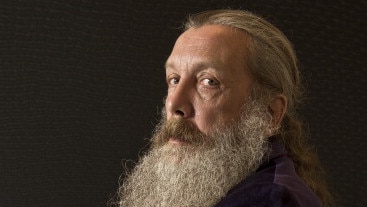Alan Moore on fantasy, imagination and his classics V for Vendetta and Watchmen
Fantasy fiction is having a cultural moment but Alan Moore – the author of V for Vendetta and Watchmen – says the genre is in danger of losing its relevance altogether.

Fantasy fiction is resurgent in popular culture but you’ve been critical of the genre. Tell me, what do you believe has gone wrong with fantasy? I think we’re all too comfortable with fantasy. We know what the furniture of fantasy will be like: there’ll be unicorns, a couple of dwarves, a dragon or two. These tropes are no longer fantastical because they’ve been so overused in books, movies and TV series. I don’t think people should regard literature as something safe and cozy.
How did those views inform the approach to your new novel, The Great When? One of the most central, important things to human existence is the relationship that we have with our imagination. In a sense, reading The Great When – and certainly in my case, writing it – is like entering that imaginative space. I was trying to make it as immersive as possible and, in some instances, as upsetting as possible.
Upsetting is a strong word. Think about this, the children go through the back of the wardrobe into Narnia, and it’s no big deal. At their first sighting of Mr Tumnus, they’re not screaming or vomiting; they’re not spending the rest of their lives in therapy because their entire reality has been shattered. But I think: if anything even remotely fantastical – something that challenged your entire view of existence – were to happen to you, you’d be in pieces.
Do you think fiction has the power to change the world? You could argue that the world of fiction is where everything in our real world starts. The technology we’re communicating on, the rooms around us and the language we’re speaking – all of it started in somebody’s imagination. It all began as “fiction” and found its way into the world of cold, hard facts where we trip over the doorstep and bark our shins on the table.
You are responsible for comic book classics such as V for Vendetta and Watchmen. Where do you think your creativity stems from? When I was very small ... four, five, six years old, coming from a working-class background, we didn’t have many toys. So instead, I took to my motley collection of soldiers – an assortment of GIs, cowboys, Indian chiefs and the odd Roman gladiator – and decided that they would have powers, or that the Indian chief was a time-travelling shaman. My imagination was my most luxurious toy. I had to work at it.
Are the current conditions of modern life conducive to developing a strong imagination? We certainly should value our imagination more than we do. Much as I like fantasy and art and entertainment, I don’t like escapist fantasy. It can become a treacherous sucking bog in which we spend all our hours drifting, imagining what it will be like when we win the lottery. We lose ourselves in a box set, a movie or a book, and neglect the reality around us. Shutting off from the world and pretending you’re in Middle-earth or the Marvel Cinematic Universe isn’t actually going to help.
Well, what would you advise? You have to develop it. It’s like a muscle. When I started out, my imagination was a pallid thing compared to what it is right now. After 40 years of heavy weightlifting, my imagination is ripped.
The Great When is out now through Bloomsbury




To join the conversation, please log in. Don't have an account? Register
Join the conversation, you are commenting as Logout